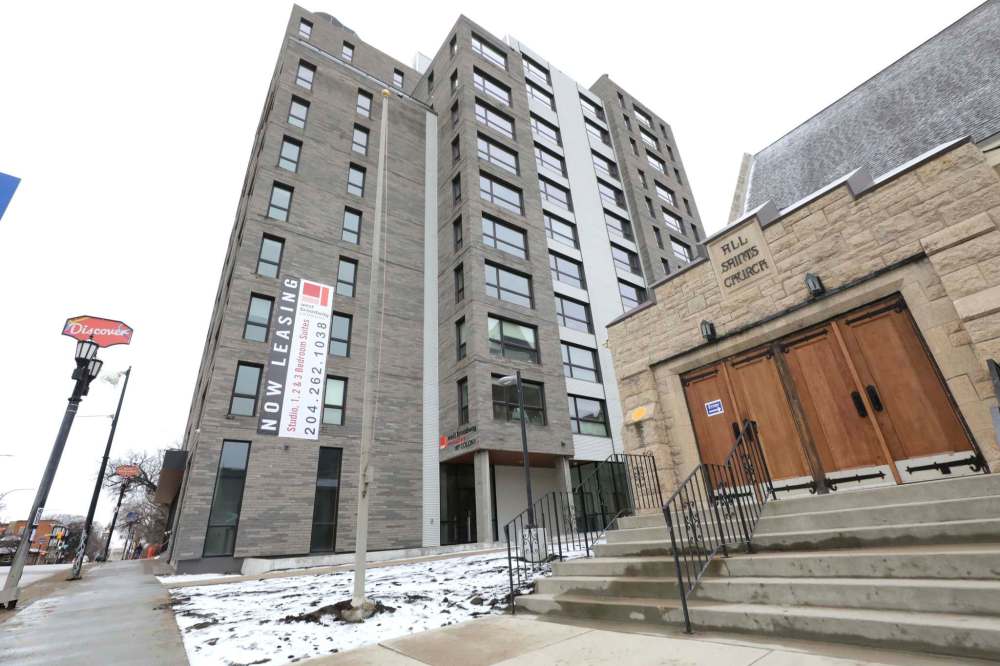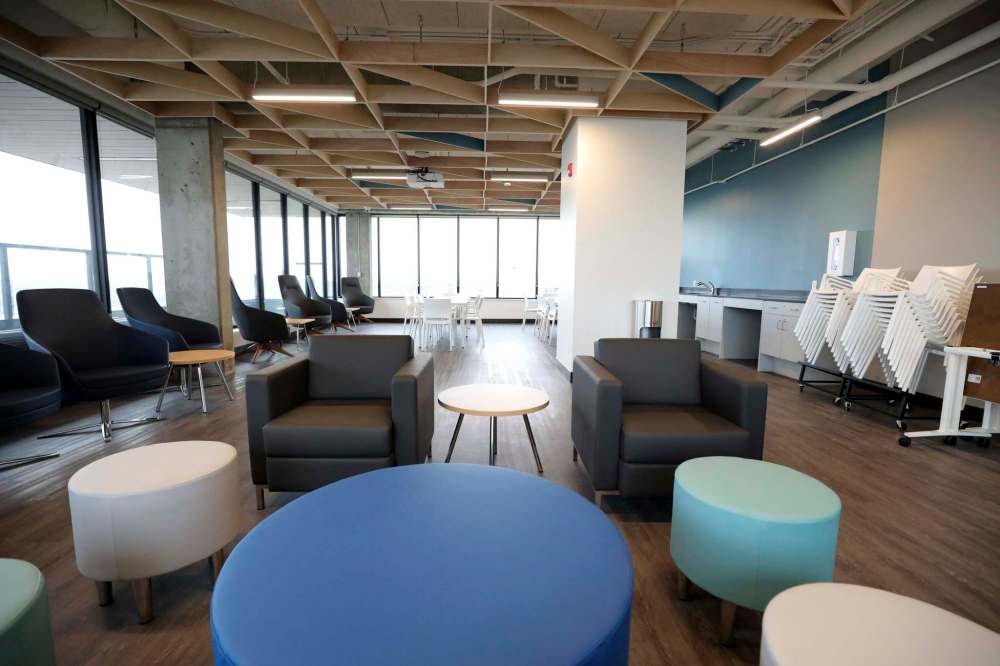Prayers answered
West Broadway Commons addresses the need for affordable housing in All Saints Church redevelopment
Advertisement
Read this article for free:
or
Already have an account? Log in here »
To continue reading, please subscribe:
Monthly Digital Subscription
$1 per week for 24 weeks*
- Enjoy unlimited reading on winnipegfreepress.com
- Read the E-Edition, our digital replica newspaper
- Access News Break, our award-winning app
- Play interactive puzzles
*Billed as $4.00 plus GST every four weeks. After 24 weeks, price increases to the regular rate of $19.00 plus GST every four weeks. Offer available to new and qualified returning subscribers only. Cancel any time.
Monthly Digital Subscription
$4.75/week*
- Enjoy unlimited reading on winnipegfreepress.com
- Read the E-Edition, our digital replica newspaper
- Access News Break, our award-winning app
- Play interactive puzzles
*Billed as $19 plus GST every four weeks. Cancel any time.
To continue reading, please subscribe:
Add Free Press access to your Brandon Sun subscription for only an additional
$1 for the first 4 weeks*
*Your next subscription payment will increase by $1.00 and you will be charged $16.99 plus GST for four weeks. After four weeks, your payment will increase to $23.99 plus GST every four weeks.
Read unlimited articles for free today:
or
Already have an account? Log in here »
Hey there, time traveller!
This article was published 29/03/2021 (1662 days ago), so information in it may no longer be current.
It was 2016, and the parish hall at All Saints Church had seen better days. Built in the 1960s, the hall had been used so much, and by so many, that it was already falling into disrepair: the basement was plagued by extensive structural problems, the kitchen, where the charity Agape Table had operated for nearly 30 years, was condemned. Repairs would have cost millions of dollars the church didn’t have.
“It was far more expensive than we could contemplate,” says Sandi Mieletz, the rector’s warden, who says the church did not want to sell the land, which abuts the 85-year-old stone church at the corner of Broadway and Colony Street. “We wanted to repurpose it, and we wanted to do something that would solve our problems but also give back to the community.”
A request for proposals was written up, making clear the church’s intentions of developing a socially conscious housing development with an emphasis on affordability and accessibility, especially important as housing grew more expensive in the neighbourhood and city. Eight responses came in, says Mieletz, the vice-chair of the church’s housing committee, and seven essentially proposed a commercial apartment tower, geared toward profit.

“The only one that differentiated itself was the University of Winnipeg Community Renewal Corporation,” she says.
The corporation proposed a unique joint venture: the church, and the Anglican Church of Canada, would lease the land to it to develop a mixed-income apartment tower — over half of its units to be classified as affordable, the rest at market or premium rates — with any surplus being shared between the two non-profit organizations. For All Saints, it was a way to ensure it could cover its costs in maintenance, upkeep and outreach, and for the corporation, now known as UWCRC 2.0, it was a way to grow its footprint in the downtown as a rising leader in sustainable housing.
Five years later, the West Broadway Commons stands 12 storeys tall where the parish hall once stood. And only a few short months after opening, nearly two-thirds of its 110 units have been leased, including each of the 56 affordable units. Monthly rents for those units range from $608 for a studio, $775 for a one-bedroom, $980 for a two, or $1,244 for three, about 20 per cent lower than the CMHC’s median market rental cost. None of the units are classified as rent geared to income; a third of all units are barrier-free or barrier-free adaptable.
Jeremy Read, the corporation’s CEO, says his organization’s vision aligned very closely to that of the church. Over the past five years, the corporation has become one of the downtown’s busiest developers, with 331 units now split amongst the mixed income West Broadway Commons, the Downtown Commons, and Muse Flats buildings. Of those, 148 are classified as affordable.
In All Saints, Read says the corporation found a willing partner and a template for sustainable housing in West Broadway, a neighbourhood with one of the city’s lowest median incomes and facing a growing spectre of gentrification.
“We’re meeting a need we know exists in the neighbourhood, both in terms of quality market housing and quality affordable housing,” says Read.
The new building, built over the course of two years by Bockstael Construction and designed by Number TEN Architectural Group, cuts a striking image on Broadway. It towers over other nearby apartment blocks, and though it has a modern, cubist look, with huge windows, it nods to the area’s historic buildings with a significant amount of stone masonry. Both Read and Mieletz said it was important to make a statement while fitting into the neighbourhood’s look. From an efficiency standpoint, the building’s energy rating is 30 per cent better than required by the 2015 National Energy Building Code.
The building also features a common ninth-floor wraparound terrace area, a gym overlooking the legislative building, common areas, bike storage, concrete soundproof walls, and resident memberships for the Peg City Car Co-Op. The main floor has two commercial spaces, the larger of which has been leased out to the Canadian Mental Health Association as a youth hub, while the goal is to create a corner cafe´ with a patio area in the smaller space.

“In the end we couldn’t afford to make it wholly brick, but I think it’s a pretty handsome building,” Mieletz says.
Funding for the $30.2-million project was mostly — over $25 million — derived from the federal government’s national housing co-investment fund and rental construction financing initiative. The provincial government kicked in just over $1 million.
Mieletz says the need for such a building has become increasingly evident in recent years, as rental costs rise, the existing affordable housing stock ages, and housing insecurity grows. Before construction began, an encampment of as many as 40 houseless people sprouted on the parish lawn during the spring of 2018. For a time, the church allowed the encampment to remain, even paying for a portable toilet to be brought in. Ultimately, the camp was shut down.
“The need for affordable housing has become so obvious,” she says, pointing to growing gentrification in the area over her 20 years of involvement with the church. Before the building was even being marketed, a waitlist for affordable units had already begun.
That list now includes 250 names, according to Read. “That tells me there’s significant demand for quality affordable housing in the centre of the city,” he says.
It also shows there’s more work to be done by developers to address housing need, and to keep the neighbourhood and surrounding areas accessible financially to renters, many of whom have seen incomes plummet or disappear as a result of the pandemic.
Read says the corporation is already at work on other potential projects in the downtown, and is a partner in the future Marketlands project on the former site of the Public Safety Building and civic parkade, which will include 102 rental units, over half of which will be available at rates well below the median market rent.

Mieletz says she’s been encouraged by the quick uptake of the units at West Broadway Commons, but that’s also reiterated the need for more housing like it across the city.
“What really stood out to me was the role that social enterprise organizations are playing, which is very critical,” Mieletz says, saying the church could not have developed the project alone.
“They bridge the gap between straight commercial development and programs like Manitoba Housing,” she adds. “I think that creates nicer places that look after both social and semi-commercial concerns at the same time. That, to me, is a way forward.”
ben.waldman@freepress.mb.ca

Ben Waldman is a National Newspaper Award-nominated reporter on the Arts & Life desk at the Free Press. Born and raised in Winnipeg, Ben completed three internships with the Free Press while earning his degree at Ryerson University’s (now Toronto Metropolitan University’s) School of Journalism before joining the newsroom full-time in 2019. Read more about Ben.
Every piece of reporting Ben produces is reviewed by an editing team before it is posted online or published in print — part of the Free Press‘s tradition, since 1872, of producing reliable independent journalism. Read more about Free Press’s history and mandate, and learn how our newsroom operates.
Our newsroom depends on a growing audience of readers to power our journalism. If you are not a paid reader, please consider becoming a subscriber.
Our newsroom depends on its audience of readers to power our journalism. Thank you for your support.

